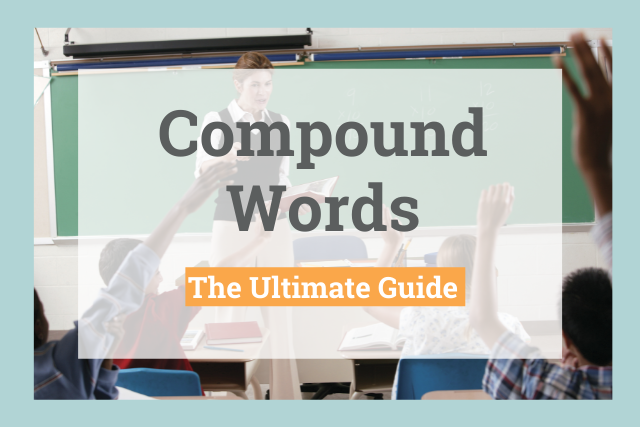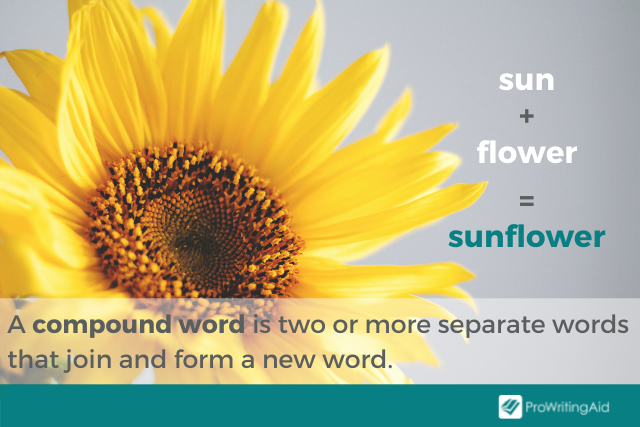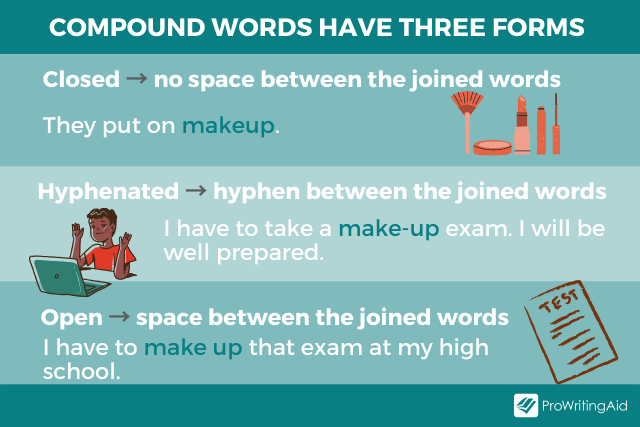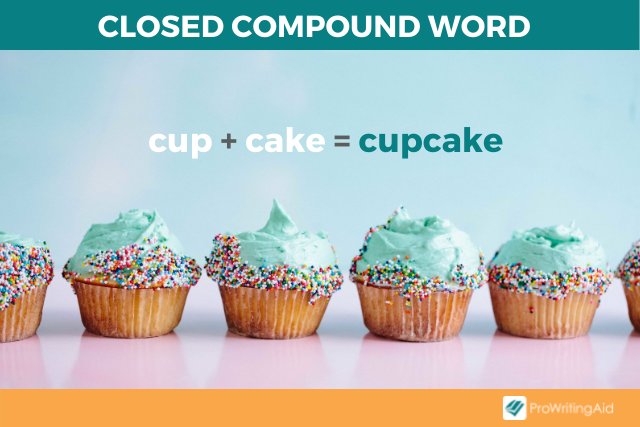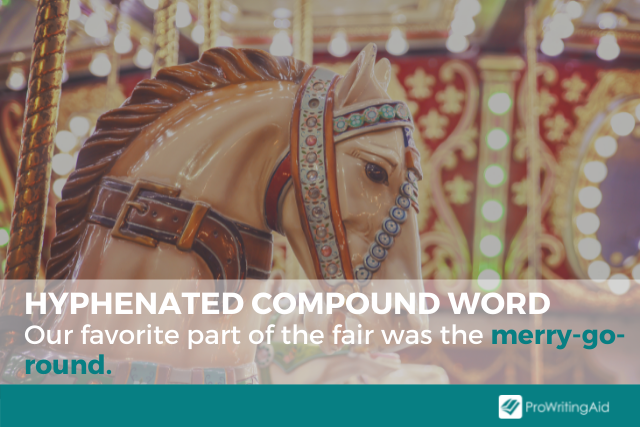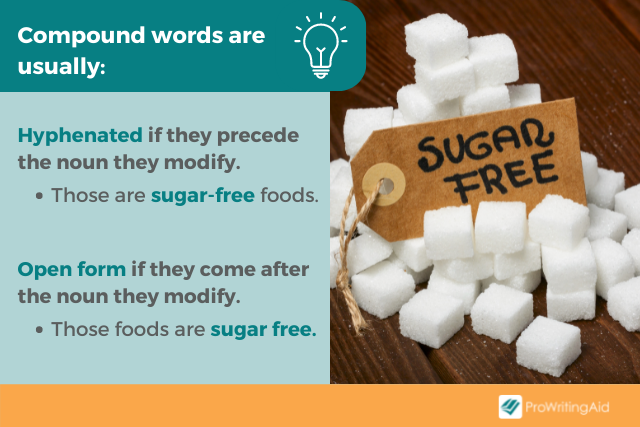The words pancake, living room, and merry-go-round have something in common.
They are all examples of compound words.
The noun compound means something made up of two or more separate components. Compound can also be an adjective meaning consisting of two or more parts or components.
A compound word is one word, or one unit of meaning, that is created by joining two or more separate words together.
What Are Compound Words?
A compound word is a word made up of usually two but sometimes more words that are joined together. The two (or more) that make the compound word are independent words; they have their own distinct meanings. When those words are joined and form a compound word, that compound word has its own new meaning.
The Three Types of Compound Words
Compound words can take three possible forms: closed, open, or hyphenated. In closed form, there is no space between the joined words. In open form, there is a space between the “joined” words that still act as one unit, and in hyphenated form—you guessed it! There is a hyphen between the joined words.
These general “rules”—which are somewhat fluid and flexible—provide guidance as to what format a compound word takes.
-
Closed compound words are usually nouns: They put on makeup.
-
Open compound words are usually nouns or verbs: I have to make up (verb) that exam at my high school. (noun)
-
Hyphenated compound words are usually adjectives or adverb-adjective combinations: I have to take a make-up (adjective) exam. I will be well-prepared. (adverb + adjective)
The key word in each of those examples is “usually.” Some compound words break the rules. We’ll see how soon.
1. Closed Compound Words
To review: closed compound words are usually made up of two separate words that are put together to form a new word. There is no space between the two words in a closed-form compound word; the compound appears as one single word.
Examples of Closed Compound Words
-
Cup + cake becomes cupcake
-
Basket + ball becomes basketball
-
Key + board becomes keyboard
-
Extra + ordinary becomes extraordinary
-
Birth + day becomes birthday
You can see through these examples that the meaning of the compound word is not just a merger of the independent definitions of the individual words that join together to make that compound.
However, there is a relationship between the individual word meanings and the compounds. Compound words have been integrated into language as speakers have discovered those relationships. It makes perfect sense to call a cake that could fit into a cup a cupcake and to call a ball thrown through a basket (now a hoop) a basketball.
The rules for compound words, listed earlier in the post, include the word usually. That word means the rules are not hard and fast, and there are examples of compound words that break those rules.
For example, compound words that are verbs are usually open form, but here are rule-breaking closed-form compound verbs that remind us to hold those rules loosely:
-
I need to proofread my essay.
-
I think the clerk shortchanged me.
-
I have to babysit my little sister.
2. Open Compound Words
In an open compound word, there is a space between the two independent words, though they are still treated as one unit with a new “compound meaning.”
Examples of Open Compound Words
-
Living room: as a unit, this compound noun refers to a room in a house.
-
High school: as a unit, this compound noun refers to a school that has students in grades 9-12.
-
Post office: as a unit, this compound refers to a building where mail is collected, sorted, and sent.
-
Give up: as a unit, this compound verb means to stop trying.
-
Ask for: as a unit, this compound verb means to request something.
3. Hyphenated Compound Words
Hyphenated compound words have hyphens between each of the independent words that serve as connectors. The hyphens are a visual cue that the words form one unit.
Some compound words are always hyphenated.
-
Merry-go-round
-
Mother-in-law (and brother-, sister-, and father-in-law)
-
Self-esteem
Did you notice that all of those examples are nouns? Remember: the rules are flexible!
Examples of Hyphenated Compound Adjectives:
When compound words are used as adjectives (officially known as compound adjectives), the hyphenation rules change depending on where the compound adjective comes in the sentences.
If the compound adjective comes before the noun it modifies (describes), you should usually add a hyphen:
-
High-speed chase
-
Part-time employee
-
Full-time job
-
Fire-resistant pajamas
-
Good-looking person
-
Well-respected politician
-
Up-to-date records
Of course, there are exceptions. Remember, those “rules” are flexible. Some compound adjectives that precede the nouns they modify never take a hyphen. For example, ice cream and high school:
- High school students
- Ice cream sundae
There’s really no “why” to explain these exceptions; we’ve just adopted these forms and made them part of our language.
Examples of Open-Form Compound Adjectives
If the compound adjective comes after the noun it modifies, the hyphen is usually omitted.
-
Make sure the files are up to date. “Up to date” modifies, but comes after, the noun “files.”
-
The cat is two years old. “Two years old” modifies, but comes after, the noun “cat.”
Though post-noun modifiers don’t technically take hyphens, according to Merriam-Webster, usage trends indicate the hyphens are often included anyway, if the compounds “continue to function as unit modifiers.” So there’s that flexibility again.
What About Adverb Compounds?
It’s easy to find examples of closed, open, and hyphenated adverbs.
As for the closed-form examples, we probably don’t even register them as compound words much of the time.
-
Sometimes
-
Thereafter
-
Somewhere
Open-form adverbs occur when the adverb is the first word in the compound and ends in —ly. You should not hyphenate after an —ly adverb.
-
We made the discovery early on.
-
Her opinion is highly regarded.
-
They entered the dimly lit room.
What to Do If You’re Not Sure Which Form Is Right
While those flexible rules can help you, there may still be times when you feel confused about which compound form to use. Don’t stress too much.
According to Merriam Webster, the rules are more like patterns. You may see differences in different publications depending on editorial choice and style. For example, I looked on Amazon for a teapot. I saw mostly teapots, but also a few tea pots. Out of curiosity I put “tea pot” into a New York Times search bar, and found articles from the 1800s that included “tea-pot” in the title!
While interesting, those stylistic changes and choices shouldn’t be too surprising. Language is fluid and ever-evolving. Compound words themselves are proof of that evolution.
Keep Clarity the Focus
The purpose of hyphens in compound words is to ensure clarity. For example,
-
I bought over-the-counter medication.
-
He passed the medicine over the counter.
In the first example, I know by the hyphen that the medicine «I» bought did not require a prescription. «Over-the-counter» is one unit—one compound—describing a type of medicine.
In the second example, «over the counter» is serving another purpose and, while the words form a phrase to tell me where «he» passed the medicine, hyphens do nothing to make the purpose of the phrase clear and are therefore unnecessary.
Now look at these examples:
- He owned a little-used car.
- He owned a little used car.
In the first example, I know the man owns a car that has not been driven much. The car is described by the compound modifier «little-used.»
In the second example, it seems that the man owns a used car that is also small, or little. In this example, putting a comma after «little» would help to separate the two words, «little» and «used,» and show that they aren’t intended to work as a compound.
ProWritingAid Can Help
Though you’re a compound-word expert now, if you find yourself with lingering doubts, remember that ProWritingAid is here to help. It will let you know if you’ve added an unnecessary hyphen after an -ly adverb, or if you’ve left one out of a pre-noun compound adjective. You don’t have to write alone!
Take your writing to the next level:
20 Editing Tips from Professional Writers
Whether you are writing a novel, essay, article, or email, good writing is an essential part of communicating your ideas.
This guide contains the 20 most important writing tips and techniques from a wide range of professional writers.
Compounding (also known as composition or nominal composition) is important in linguistics because it allows for new words to be made and exists in most, if not all, languages. For some languages (like Chinese) it is a major source of new word formation.

What is Compounding?
Compounding (from Latin componere, meaning ‘to put together’) combines two or more words to create a new one.
Steam + boat = Steamboat
Bed + room = Bedroom
Hair + cut = Haircut
Motor + cycle = Motorcycle
Compound elements
A compound is made up of various parts of speech such as a noun, verb, and adverb.
This means that compounds can be a combination of noun plus noun, verb plus noun, adjective plus noun, etc.
The word «bedroom» is made up of two nouns, bed and room.
The word «sunrise» is made up of a noun and a verb, sun and rise.
The word «greenhouse» is made up of an adjective and a noun, green and house.
Compounds can be written as one word, two separate words, or a word with a hyphen.
Note: Compounds are made up of complete words; this process is called nominal composition and should not be confused with morphological derivation.
Morphological derivation is when a new word is made from an existing word, usually by adding prefixes or suffixes. For example, employment is made of the verb employ plus the suffix morpheme —ment.
Classical compounds is another category of compounds, derived from Latin or ancient Greek.
Biography is a compound of the Greek words bios (life) and graphia (writing), which by the 17th century had become biography.
Agriculture is a compound of the Latin words ager (field) and cultura (growing / cultivation) which became ‘agriculture’ in late Middle English.
Pronunciation
Pronunciation can help to determine the meaning of words. Depending on how we pronounce a word, this can change its meaning. One important aspect of our pronunciations is stress. Let’s look at this in more detail:
Stress
Stress in pronunciation is when we place greater emphasis on one syllable or word than on other parts of a sentence; this usually helps us to recognize and understand the meaning of a word.
Stress is useful in helping us to understand the difference between a compound noun and an adjective with a noun. In the following examples, note where the stress falls:
A greenhouse = place where we grow plants (compound noun).
A green house = house painted green (adjective and noun).
A bluebird = type of bird (compound noun).
A blue bird = any bird with blue feathers (adjective and noun).
Compound elements
Noun + noun
bedroom
toothpaste
database
Noun + verb
greenhouse
software
redhead
Adverb + verb
output
overthrow
upturn
input
The Suspended Compound
The suspended compound is used to avoid repetition with longer words.
For example, instead of saying: ‘There are mostly eighteenth-century or nineteenth-century buildings in the town centre,’ we can shorten the first compound and say: » There are mostly eighteenth- or nineteenth-century buildings in the town centre. »
Other examples:
Short- and long-term plans are equally valid.
Both first- and second-class tickets cost the same.
Compounding across the globe
Compounds exist in virtually every language.
Let’s look at some examples from around the world.
| English | Italian | Spanish |
| science fiction | fantascienza | ciencia-ficción |
| science + fiction | imaginary + science | science + fiction |
| Dutch | English | Composition |
| verjaardagskalender | birthday calendar | verjaardag ‘birthday’ + calendar ‘calendar’ |
| Klantenserviceemedewerker | customer service representative | clanten ‘customers’ + service ‘service’ + medewerker ‘worker’ |
| university library | university library | university ‘university’ + library ‘library’ |
| Chinese | English | Composition |
| 谢谢 | thanks | Repeating of 謝 xiè thank |
| 摩天 楼 | skyscraper | 摩 mó touch + 天 tiān sky + 楼 lóu building (with more than 1 storey |
| 学生 | college student | 學 xué learn + 生 shēng living being |
| 百科 全書 | encyclopaedia | 百 bǎi hundred + 科 kē (branch of) study + 全 quán entire / complete + 書 shū book |
| Finnish | English | Composition |
| sanakirja | dictionary | sana ‘word’ + kirja ‘book’ |
| tietokone | computer | tieto ‘knowledge data’ + kone ‘machine’ |
| German | English | Composition |
| skyscraper | skyscraper | Clouds’ + scratches’ scraper ‘ |
| railroad | railway | Iron ‘iron’ + train ‘track’ |
| Ancient Greek | English | Composition |
| φιλόσοφος | philosopher | φίλος phílos ‘beloved’ + σοφία sophíā ‘wisdom’ |
| δημοκρατία | democracy | δῆμος dêmos ‘people’ + κράτος ‘rule’ |
| Italian | English | Composition |
| millepiedi | centipede | mille ‘thousand’ + piedi ‘feet’ |
| ferrovia | railway | ferro ‘iron’ + via ‘way’ |
Compounds and form
Compound nouns can be written in three ways: open form, closed form and hyphenated form.
Open form compounds
An open (or spaced) compound is written as two separate words.
washing machine,
water bottle.
Closed form compounds
A closed (or solid) compound is written as one word.
rainfall,
drawback,
toothpaste.
Hyphenated form compounds
A hyphenated compound is written with a hyphen.
Check in,
hanger-on,
mother-in-law.
Some compounds are made up of two similar-sounding elements, such as:
- goody-goody,
- hush-hush,
- razzle-dazzle.
These are called reduplicative compounds and are usually hyphenated if each element has one or more syllables. However, closed form is also common, as in:
- crisscross,
- knickknack,
- singsong.
Compound subclasses
Compounds are usually made up of two words:
One word gives the basic meaning of the whole compound and is called the head, the other word (the modifier) qualifies this meaning (ie. it gives us more specific information about the head).
Compounds can be divided into four subclasses:
Endocentric
Exocentric
Coordinative
Appositional
Endocentric compounds
In endocentric compounds, the meaning of the whole word tends to be clear and relates to the head.
The first word will be the modifier. The head word comes second and categorizes the compound. This is called a head final. The modifier will qualify the meaning of the head final.
In the compound word cookbook, book is the head (it gives us the main meaning) and cook is the modifier (it tells us what kind of book).
In the compound word doghouse, house is the head and dog is the modifier, and this tells us it is a house intended for a dog.
Endocentric compounds tend to be of the same part of speech (word class) as their head, as in the case of doghouse, which is made up of a noun plus noun .
Cat food tells us what type of food (food intended for cats).
Water bottle tells us what type of bottle (a bottle we can drink water from).
Because the modifier gives us a specialisation of the head word, this type of compound is also known as a descriptive compound.

Exocentric compounds
With exocentric compounds, the meaning is not obvious and often seems unrelated to any part of the compound itself.
Facebook is not a type of book.
Scarecrow is not a type of crow.
Paperback is not a type of back.
Facebook is a social media platform, yet we couldn’t guess this from the words used to make the compound. The same goes for scarecrow, a figure created to scare birds away from crops, and paperback, which is a type of book.
Exocentric compounds lack a clear head and are also often called headless compounds.
Coordinative compounds
Coordinative (or copulative) compounds are compounds with two semantic heads that work in coordination. The meanings will be related, or have similar origins, without being the same thing.
Semantic gives us the meaning or interpretation of a word.
For example, actor-manager means someone who is an actor and a theatre manager.
Producer-director is a person who is a producer and a director.
Camper-trailer is a vehicle that is a camper and a trailer.
Theater-museum is a building that is both a theater and a museum.
Coordinative compounds are often used to describe people’s professions and can be made up of as many as five words.
Designer-builder is a person who designs and builds.
Listener-viewer-reader is a person who lists, watches (films) and reads (books).
Musician-writer-fillmmaker is a musician who is also a professional writer and filmmaker.

Appositional compounds
Appositional compounds are made up of (two) words that each describe the compound differently.
For example, instead of saying ‘these prehistoric tribes were both hunters and gatherers’ you could say ‘these prehistoric tribes were hunter-gatherers’.
Player-coach means a person who is both a player and a coach.
Student-teacher is a student who also teaches.
Singer-songwriter is a singer who is also a songwriter.
Table summary
| Type | Description | Examples |
| Endocentric | A + B = a special kind of B | Whiteboard, darkroom |
| Exocentric | A + B = an external, unrelated meaning | Redhead, cowhand |
| Coordinative | A + B = ‘the sum’ of what A and B denote | Producer-director, theater-museum |
| Appositional |
A and B offer different descriptions for the same thing or person |
Hunter-gatherer, student-teacher |
Brahuvrihi compounds:
Brahuvrihi compounds are a subclass of exocentric compounds, and are also known as possessive compounds. This is when the first part (or word) of the compound is a specific feature of the second.
Hunchback is a person who has a hunched, or very curved, back.
Bluebell is a particular type of bell-shaped flower coloured blue.
A highbrow is a brow that is high (and associated with intelligence or intellect).
White-collar is a collar that is white (and therefore associated with office workers).
Barefoot is used when a person walks about without shoes on
The term comes from Sanskrit bahuvrīhi, which is also this type of compound, from bahu much + vrīh rice.
Possessive or bahuvrihi compounds are often used in English to describe characteristics of people, and can be figurative, or non-literal, in their meaning.
Green thumb suggests a person who is good at growing green things eg a gardener.
Hothead suggests a person with a quick (or ‘hot’) temper.
Egghead suggests someone who is studious or intellectual (originally a ‘bald person’, possibly associated with academics).
Goldilocks is used to describe locks of hair that are golden in color.
Greedyguts suggests someone who has a greedy stomach or is greedy by nature.
Lazybones suggests that a person is idle or lazy.
What are Compound Sentences?
Compound words are a combination of two or more words.
Compound sentences are a combination of two or more independent clauses.
Some men are born mediocre, some men achieve mediocrity, and some men have mediocrity thrust upon them. (Joseph Heller, 1923-1999)
In the above sentence, we have three independent clauses. Note how they are linked by commas and the conjunction ‘and’.
A compound sentence has at least two independent clauses. They can be joined by:
- a semicolon,
- a comma and coordinating conjunction eg ‘and’, ‘or’ and ‘but’.
«I love to travel, but I hate to arrive.» (Albert Einstein, 1879-1955)
Compounding — key takeaways
- Compounding combines two or more words to create a new word.
- A compound is made up of various parts of speech such as noun, verb, and adverb.
- Compounds can be a combination of noun plus noun, verb plus noun, adjective plus noun etc.
- Compounds can be written as one word, as two separate words, or as a word with a hyphen.
- Compounds can be divided into four subclasses: endocentric, exocentric, coordinative and appositional.
- Compound sentences are a combination of two or more independent clauses, linked by ‘and’, ‘but’ or a semi-colon.
Glossary of Grammatical and Rhetorical Terms
«Eyeglasses» is an example of a compound word written as a single word.
David Ryle / Getty Images
Updated on April 30, 2018
In morphology, a compound word is made up of two or more words that express a single idea and function as a single word.
The most common types of compound words in English are compound nouns (e.g., cheeseburger), compound adjectives («red-hot temper»), and compound verbs («waterproof the deck»).
The rules for spelling compound words are not consistent. Some compound words are written as a single word (eyeglasses), some as two (or more) hyphenated words (brother-in-law), and some as two (or more) separate words (soccer stadium).
Examples and Observations
- «As the car pulled into the parking lot, Kenny Dennard whipped a snowball right at the windshield.»
(John Feinstein, Forever’s Team. Villard, 1989) - On Sunday afternoons in the summer, my grandfather and I enjoyed eating hot dogs at the ballpark.
- «While we were waiting for our food, I played with my chopsticks. They make excellent drumsticks. I also told Dad all about this big baseball game we were going to play after school the next day.»
(Dan Greenburg, Zack Files 13: The Misfortune Cookie. Turtleback, 1998) - «He hid in a cave until the ship had left, only to find that his shipmates had taken pity on him, and left him a barrel of biscuits and a fire, which he kept alight for months. A year later a southbound ship stopped by.»
(Simon Winchester, Outposts. Penguin, 2003) - «A diary can take almost any form: written responses to a periodic e-mail reminder, a handwritten notebook, a narrated video, or photos with written commentary.»
(Kim Goodwin, Designing for the Digital Age. Wiley, 2009) - «In Aboriginal Australia all home building was do-it-yourself.»
(Tony Dingle, «Necessity the Mother of Invention, or Do-It-Yourself.» A History of European Housing in Australia, ed. by Patrick Troy. Cambridge University Press, 2000) - «I became a shop steward immediately and a trustee in 1936. . . . I became the local’s secretary-treasurer in 1946.»
(Mary Callahan, quoted in Rocking the Boat: Union Women’s Voices, 1915-1975. Rutger’s University Press, 1996) - «On a hot day, nothing beats walking into a nice, cool, air-conditioned home. Unfortunately, running your air conditioner is expensive and eats up energy.»
(Eric Corey Freed, Green Building & Remodeling For Dummies. Wiley, 2008) - Heads of Compound Words
«One part of a compound word is usually clearly its head, in a general way able to represent the meaning of the whole compound. The heads of the various types of compound word are [in capital letters] in this list: bellBOY, spin-DRY, red HOT, inTO, and/OR. It can be seen that in English, the head of a compound word is always the last element, on the right-hand end. (This is not true of compound words in all languages, however.)»
(James R. Hurford, Grammar: A Student’s Guide. Cambridge University Press, 1994) - Dividing Compound Words
«If you divide a compound word at the end of a line, place the hyphen between the elements of the compound (snow-mobile, not snowmo-bile).»
(Laurie Kirszner and Stephen Mandell, The Concise Wadsworth Handbook, 2nd ed. Wadsworth, 2008) - Metaphorical Compounds
«Metaphors furnished with common household objects are figures of speech that we literally live with every day. Some of these comparisons are new, such as a couch potato, a phrase that compares lumpish watchers of television to lumpy potatoes: the longer couch potatoes sit, the deeper they put down their roots.»
(Richard Lederer, The Play of Words. Simon & Schuster, 1990) - Complex Compounds
«It is possible to form a compound from two words one of which is itself a compound. For example, we can combine the compound law degree with the word requirement to get the complex compound law degree requirement. This compound can in turn be combined with changes to get law degree requirement changes, and so on. . . . [T]he process is essentially unlimited.»
(Bruce Hayes. Introductory Phonology. Wiley, 2009)
English language has a rich vocabulary. The vocabulary of a language is enriched in different ways. Borrowing words from other languages is one of them. Creating new words by adding suffixes or prefixes to existing words is another method.
We can also form new words by joining two existing words. Words thus formed are called compound words. Here are some examples of compound words: market-day, sackcloth, nobleman, schoolmistress, hazelnut, innkeeper, bus-conductor, good-natured, light-hearted, dim-sighted etc.
Compound words can be verbs, adjectives or nouns.
Compound words may be written as one word. Examples are: flashlight, headache, grandfather, classroom etc.
Some compound words are hyphenated. Examples are: left-handed and newly-weds.
Sometimes they are written as two words. Examples are: living room, flower vase, head nurse, new moon, post office.
Complete the following sentences using appropriate compound words. The first part of the expression has been given in the brackets.
1. My grandmother does not step out of the house without her ………………. (walking)
2. The …………………. young man helped the traveler find his way. (kind)
3. The ………………… were blessed by the elderly. (newly)
4. We need to buy some furniture for the ………………….. (living)
Answers
1. My grandmother does not step out of the house without her walking stick.
2. The kind-hearted young man helped the traveler find his way.
3. The newly-weds were blessed by the elderly.
4. We need to buy some furniture for the living room.
There are various classes of words in the English Language ranging from nouns to prepositions. All these have been discussed in the post, Parts of Speech. However, some words are regarded as compound words. This post gives 1000 Compound Words Examples out of the several thousands of examples of compound words in English.
There is no end to how many compound words there are in English; but with these 1000 Compound Words Examples in English, though not exhaustive, you can research further on other compound words not captured here or, probably, generate your own.
Before I list the 1000 Compounds Word Examples in English, it would be great to describe compound words. The question then comes: what is a compound word? Let us proffer an answer to this important question…
What is a Compound Word?
Compound words in English are usually formed when we join two or more words together. In other, words, a compound word is the combination of two or more free morphemes to form a new word.
Compounding: A Word Formation Process
This takes us to the concept of Compounding, which is one of the word formation processes in English. Compounding takes place when two or more free morphemes that can stand severally on their own are brought together to create a new word. It could happen that the meaning of a compound word could be related to or different from the meaning or connotation it its constituent parts when considered severally.
Types of Compound Words
There are three types of compound words and these include: closed compound words, hyphenated compound words and open compound words. See more…
Closed Compound Words
In the closed compound words, the words involved are combined together. Closed compound words, most likely, are usually monosyllabic units already established in the language for a long time. Examples include: flowerpot, keyboard, notebook, bookstore, basketball, etc.
Hyphenated Compound Words
For the hyphenated compound words, a hyphen is used to join the words involved; for example: mother-in-law, merry-go-round, off-the-cuff, etc. The use of a hyphen in this instance helps to prevent ambiguity.
Open Compound Words
In the open compound words, there is a space between the compound words that are written together such as school bus, living room, carbon dioxide, snow white, blood red, etc.
What Determines Types of Compound Words
What determines if a compound word is classified as closed, hyphenated or open could depends on whether we use it as a noun, adjective or verb.
Verbs are usually open. For example:
- You must always back up the files on your computer.
- It is not good for students to carry over their courses
- Police usually follow up on a new lead.
Adjectives and nouns are usually closed or hyphenated. For instance:
- You can access backup copies of your files in case of any eventuality.
- The students had many carryovers in their courses.
- The police had already worked on the follow-up lead.
Adjective–adjective compounds, as well as, verb–verb compounds, such as blue-green and freeze-dried, are often hyphenated. Compounds that contain articles, prepositions or conjunctions, such as rent-a-cop, mother-of-pearl and salt-and-pepper, salt-and-sugar, hard-and-fast, etc. are also often hyphenated.
Longer words usually fall under the category of open compound words such as distance learning, player piano, lawn tennis, etc.
It is important to note that usage or forms of compound words in American English and British English Usage varies and is usually contingent on the individual choice of the writer rather than on a hard-and-fast rule; therefore, it is possible to encounter closed, hyphenated, and open forms for the same compound noun, such as the trio of:
- Container ship, container-ship or containership
- Particle board, particle-board or Particleboard.
Classifications of Compound Words
The constituent words in a compound word can be classified based on their Word Classes or Parts of Speech. We can call this type of classification a Syntactic Classification. The constituent words may be from similar Part of Speech or may be of different parts of speech. Let us see some examples:
Noun-Noun
This is an instance where both constituent words in the compound words are nouns. Examples include: airport, wallpaper, textbook, doorknob, waterbed, wastebasket, football, cufflinks, housewife, lawsuit, wallpaper, basketball, sodium chloride, classroom, workstation, tapeworm, crankshaft, etc.
Noun-Verb
The noun-verb compound word has a noun as the first constituent and a verb as the second constituent. For example: browbeat, sidestep, manhandle, safeguard, water borne, value-added, rocket-propelled, sunbathe, airlift, etc.
Noun-Adjective
The noun-adjective combination has a noun as the first constituent and an adjective as the second constituent. Examples include: snow white, world population, overcoat, trustworthy, blood red, handpicked, world famous, heartbroken, heart problem, prize worthy, lead strong, worldwide, lifelong, tax-free, sky blue, self-important, spoon-fed, praiseworthy, water-repellant, air-tight, bulletproof, etc.
Adjective-Noun
This is an instance where the first constituent word in the compound word is an adjective and the other one a noun. Examples include: blackboard, smartphone, whiteboard, badmouth, blue sky, red light, four wheel, full-time, long-term, etc.
Adjective-Verb
This instance is when the first constituent is an adjective while the second word in the compound word is a verb. Examples of this instance include: whitewash, blacklist, highlight, proofread, shortlist, etc.
Verb-Verb
In this instance, both constituents of the compound words are verbs. Examples include: typewrite, test-drive, freeze-dry, etc.
Verb-Noun
This is an instance where the first constituent word in the compound word is a verb and the other one a noun. Examples include: dreadnought, typewriter, breakfast, cutthroat, pickpocket, killjoy, spoilsport, know-nothing, breakwater, carrycot, etc.
Verb-Preposition
In this instance, we have a combination of a verb and a preposition forming the compound word respectively. Examples of this instance include: Roll off, roll on, stick on, walk on, stand by, walk through, see through, lay by, cut through, lookout, Work on, take down, take away, tear up, etc. Some of these examples also pass for Phrasal Verbs. You can take a look at the over 500 Phrasal Verbs discussed here.
Preposition-Noun
In this combination of compound words, we have a preposition coming first and followed by a noun. Examples of this combination include: overview, downsize, upgrade, underworld, oversight, undergraduate under-development, etc.
Preposition Noun (Phrase) Combinations
Examples of Preposition-Noun Phrase include: Off-the-record, over-the-counter, off-the-cuff, round-the-block, off-the-deep-end, off the hook, off the wall, off-your-head, off-your-own-bat, off-your-rocker, round-the-twist, round-the-corner, etc.
Preposition-Verb
This combination comprises a preposition and a verbs in the first and second constituents respectively. Examples include: overhang, counterattack, undercut, overpay, counterbalance, overrate, underlie, outrun, outvote, overreact, oversleep, overwork, undersell, undervalue, etc.
Other Combinations
There are other possible combinations like:
- Adjective-adjective (blue-green)
- Adverb-preposition (forthwith)
- Verb-adverb (tumbledown)
- Preposition-adjective (overripe, off-white)
- Verb-adverb (takeout)
- Preposition-adverb (without)
- Compound Adverbs (moreover, however, nonetheless, furthermore, meanwhile)
- Determiner-Noun Combinations or wh-forms (anyhow, somewhere, nowhere, sometimes, anytime)
You can attempt to fit the 1000 examples of compound words provided below into their appropriate combinations. I’m sure that should not be difficult for you to do.
It is also important to note that compound words in English, save for exceptions, are usually stressed on their first words.
1000 Compound Words Examples
It is really impossible to give an exhaustive list of all the compound words in English; especially, those that fall under the open class segment as there is no end to compound words that could be therein generated. But the list below contains 1000 Compound Words Examples in English. For emphasis, there are thousands of other examples. So, the list is not limited to what is provided below. Take a look…
1000 Compound Words Examples (A-D)
- Above-board
- Afterglow
- Afterimage
- Afterlife
- Afternoon
- Airbag
- Airbase
- Airborne
- Aircraft
- Airfield
- Airlift
- Airline
- Airmen
- Airplane
- Airport
- Airtight
- Airtime
- All-over
- Allspice
- Alongside
- Anybody
- Anyhow
- Anymore
- Anyone
- Anyplace
- Anytime
- Anyway
- Arm-twist
- Ashtray
- Baby bed
- Baby boom
- Baby boomers
- Baby carriage
- Baby-faced
- Babyhood
- Babyminder
- Babysit
- Babysitter
- Backache
- Backbeat
- Backbench
- Backbenchers
- Backbend
- Backbite
- Backblast
- Backbone
- Backbreaker
- Backdrop
- Backfire
- Background
- Backhand
- Backlash
- Backlog
- Backpack
- Backside
- Backslap
- Backslide
- Backspace
- Backspin
- Backstage
- Backstroke
- Backtrack
- Backward
- Ballpark
- Ballroom
- Bandwagon
- Bankbook
- Bankroll
- Baseball
- Basketball
- Beachcomb
- Bedclothes
- Bed lamp
- Bedrock
- Bedroll
- Bedroom
- bedspread
- Bellbottom
- Bellboy
- Bellhop
- Below
- Berrylike
- Billboard
- Billhook
- Bitterroot
- Bittersweet
- Bitterweed
- Bitterwood
- Blackball
- Blackberries
- Blackbird
- Blackboard
- Blackjack
- Blacklist
- Blackmail
- Blackout
- Blackpool
- Blacksmith
- Blacktop
- Blowgun
- Bluebell
- Blueberry
- Bluebird
- Bluefish
- Bluegrass
- Blueprint
- Boardwalk
- Body bag
- Body-boarding
- Body blow
- Bodybuilder
- Body hair
- Bodywork
- Bodyguard
- Bodywork
- Boldface
- Bookcase
- Bookend
- Bookkeeper
- Bookmark
- Bookmobile
- Bookseller
- Bookshelf
- Bookstore
- Bookworm
- Bootstrap
- Bowlegs
- Bowtie
- Brainchild
- Brainwash
- Brotherhood
- Brow beat
- Bugspray
- Butterball
- Buttercup
- Butterfingers
- Butterflies
- Buttermilk
- Butternut
- Butterscotch
- Bypass
- Cabdriver
- Candlelight
- Candlestick
- Candyfloss
- Candytuft
- Cardboard
- Cardsharp
- Cardstock
- Carefree
- Caretaker
- Careworn
- Carfare
- Cargo
- Carhop
- Carload
- Carpetbagger
- Carpool
- Carport
- Carrack
- Carryall
- Carsick
- Cartwheel
- Catchword
- Cattail
- Catwalk
- Caveman
- Centercut
- Cheeseburger
- Cheesecake
- Classmates
- Classroom
- Clockwise
- cocksure
- Coffeemaker
- Comeback
- Comedown
- Commonplace
- Commonwealth
- Cornmeal
- Counterattack
- Counterproductive
- Courthouse
- Courtyard
- Crewcut
- Crossbow
- Crossbreed
- Crosscut
- Crossover
- Crosswalk
- Dairymaid
- Daisywheel
- Daybed
- Daybook
- Daybreak
- Daydream
- Daylight
- Daytime
- Deadbeat
- Dead body
- Deadbolt
- Dead drop
- Dead-end
- Deadeye
- Deadfall
- Dead heat
- Dead letter
- Deadlight
- Deadline
- Dead load
- Deadlock
- Deadlocked
- Dead mail
- Dead march
- Dead metaphor
- Dickhead
- Dick test
- Dishcloth
- Dishpan
- Dishwasher
- Dishwater
- Diskdrive
- Dog-tired
- Dogwood
- Doorstop
- Double agent
- Double-barrelled
- Double-bedded
- Double bond
- Doublecross
1000 Compound Words Examples (D-N)
- Double-date
- Double-decker
- Downbeat
- Downcast
- Downcourt
- Downtime
- Downtown
- Downtrodden
- Downunder
- Drawbridge
- Driveway
- Duckbill
- Duckpin
- Duckweed
- Earache
- Eardrop
- Eardrum
- Earring
- Earthbound
- Earthquake
- Earthward
- Earthworm
- Egghead
- Eggshell
- Elsewhere
- Everything
- Extraordinary
- Eyeballs
- Eyebath
- Eyebeam
- Eye-catching
- Eyeglasses
- Eyelash
- Eyelid
- Eyesight
- Eyewitness
- Fatherhood
- Fatherland
- Firearm
- Fireball
- Fireboat
- Firebomb
- Firebreak
- Firecracker
- Firefighter
- Fireflies
- Firehouse
- Fireproof
- Firewater
- Fishbowl
- Fisherman
- Fisheye
- Fishhook
- Fishlike
- Fishmonger
- Fishnet
- Fishpond
- Fishtail
- Football
- Foothill
- Footlights
- Footlocker
- Footnote
- Footprint
- Footprints
- Footrest
- Footwear
- Forbearer
- Forbid
- Forebode
- Forearm
- Forebear
- Forebrain
- Forecast
- Forecastle
- Foreclose
- Foreclosure
- Foredoom
- Forefather
- Forefeet
- Forefinger
- Forefoot
- Forego
- Foregone
- Foreground
- Forehand
- Forehead
- Foreknowledge
- Foreleg
- Foreman
- Foremost
- Forepaws
- Foresee
- Foreshadow
- Foresight
- Forestall
- Forethought
- Foretell
- Foretold
- Forever
- Forewarn
- Foreword
- Forget
- Forgive
- Forklift
- Format
- Fortnight
- Friendship
- Fruitcup
- Gearshift
- Glassmaking
- Goodbye
- Goodnight
- Grandaunt
- Grandchild
- Grandchildren
- Granddaughter
- Grandfather
- Grandmaster
- Grandmother
- Grandnephew
- Grandnieces
- Grandparent
- Grandson
- Grandstand
- Granduncle
- Grasshopper
- Grassland
- Graveyard
- Gumball
- Haircut
- Hamburger
- Hammerhead
- Handbook
- Handcuff
- Handgun
- Handmade
- Handout
- Headache
- Headdress
- Headlight
- Headline
- Headquarters
- Heaven-sent
- Heavenward
- Helpdesk
- Helpline
- Helpmate
- Hereafter
- Hereby
- Herein
- Hereupon
- Herself
- Highball
- Highchair
- Highland
- Highway
- Himself
- Homemade
- Hometown
- Honeybee
- Honeybees
- Honeycomb
- Honeycreeper
- Honeydew
- Honeymoon
- Honeypot
- Honeysuckle
- Hookup
- Hookworm
- Horseback
- Horsefly
- Horsehair
- Horseman
- Horseplay
- Horsepower
- Horseradish
- hotbed
- hothead
- Houseboat
- Household
- Housekeeper
- Housetop
- Housework
- However
- Intake
- Interstate
- Ironwork
- Itself
- Jackpot
- Jailbait
- Jellybean
- Jellyfish
- Jetliner
- Jetport
- Jumpshot
- Jumpstart
- Keyboard
- Keyhole
- Keynote
- Keypad
- Keypunch
- Keystone
- Keystroke
- Keyway
- Keyword
- Lacklustre
- Lifeblood
- Lifeboat
- Lifebuoy
- Lifeguard
- Lifejacket
- Lifelike
- Lifeline
- Lifelong
- Lifesaver
- Lifestyle
- Lily-livered
- Lifetime
- Lifework
- Limelight
- Limestone
- Longhand
- Longhouse
- Lukewarm
- Mainland
- Mainline
- Matchbox
- Meantime
- Meanwhile
- Moneybag
- Moneylender
- Moonbeam
- Moonflower
- Moonlight
- Moonlit
- Moonscape
- Moonshine
- Moonstruck
- Moonwalk
- Moorfields
- Moorfowl
- Moorland
- Mopboard
- Moreover
- Mothball
- Motherhood
- Motorcycle
- Nearby
1000 Compound Words Examples (N-S)
- Nevermore
- Newborn
- Newfound
- Newsboy
- Newsbreak
- Newscaster
- Newsdealer
- Newsletter
- Newsman
- Newspaper
- Newsperson
- Newsprint
- Newsreel
- Newsroom
- Newsstand
- Newsworthy
- Nightfall
- Noisemaker
- Northeast
- Notebook
- Noteworthy
- Nowhere
- Nursemaid
- Nutcracker
- Offbeat
- Off-record
- Oilbird
- Oilcan
- Oilcloth
- Oilfield
- Oilman
- Oil-rich
- Oneself
- Onetime
- Outbalance
- Outbid
- Outboard
- Outdoor
- Outflank
- Outflow
- Outlive
- Outnumber
- Overabundance
- Overboard
- Overcoat
- Overflow
- Overland
- Overshoes
- Overview
- Pacemaker
- Pancake
- Passbook
- Passkey
- Passover
- Paycheck
- Peppermint
- Pickup
- Pinhole
- Pinstripe
- Pinup
- Pinwheel
- Pipe-borne
- Play-actor
- Playback
- Playbill
- Playbook
- Playboy
- Play day
- Play dough
- Playground
- Playhouse
- Playthings
- Ponytail
- Popcorn
- Postcard
- Poverty grass
- Poverty level
- Poverty line
- Poverty trap
- Poverty-stricken
- Priesthood
- Punchbag
- Punchboard
- Punchbowl
- Racquetball
- Railroad
- Railway
- Rainbow
- Raincheck
- Raincoat
- Raindrop
- Rainstorm
- Rainwater
- Rattlesnake
- Rattletrap
- Repairman
- Riverbanks
- Rollerblade
- Rollercoaster
- Roller-skating
- Rubberband
- Sailboat
- Salesclerk
- Sand dune
- Sandlot
- Sandstone
- Saucepan
- Scapegoat
- Scarecrow
- Schoolbook
- Schoolboy
- Schoolbus
- Schoolhouse
- Schoolwork
- Seaport
- Seashore
- Setback
- Shadyside
- Sharecropper
- Sharpshooter
- Sheepskin
- Shipbottom
- Shoelace
- Shoemaker
- Shortbread
- Showoff
- Showplace
- Sideburns
- Sidekick
- Sideline
- Sideshow
- Sidestep
- Sidetrack
- Sidewalk
- Silver age
- Silver ash
- Silver beech
- Silver bell
- Silver berry
- Silver-blue
- Silver-bodied
- Silver bromide
- Silver-bush
- Silver cord
- Silver dollar
- Silver fern
- Silver fir
- Silverfish
- Silver grass
- Silver-gray
- Silver-green
- Silver-haired
- Silversmith
- Sisterhood
- Sixfold
- Skateboard
- Skintight
- Skylark
- Skylight
- Skyscraper
- Slapstick
- Slowdown
- Slumlord
- Smartphone
- Snakeskin
- Snowball
- Snowbank
- Snowbird
- Snowboard
- Snowdrift
- Snowfall
- Snowflakes
- Snowshovel
- Softball
- Software
- Somebody
- Someday
- Somehow
- Someone
- Someplace
- Something
- Sometimes
- Somewhat
- Somewhere
- Soulmate
- Soundproof
- Southeast
- Southwest
- Soybean
- Spacewalk
- Spearmint
- Spillway
- Spokesperson
- Stagehand
- Stage-manage
- Standby
- Standoff
- Standout
- Standpipe
- Standpoint
- Starfish
- Steamboat
- Steamship
- Stepson
- Stockroom
- Stonewall
- Stoplight
- Stopwatch
- Storerooms
- Stronghold
- Subway
- Sunbaked
- Sunbathe
- Sunbeams
- Sunbelt
- Sunberry
- Sunblock
- Sunburn
- Sunday
- Sundial
- Sundown
- Sunfish
- Sunflower
- Sunglasses
- Sunlit
- Sunrays
- Sunroof
- Sunup
- Supercargo
- Supercharge
1000 Compound Words Examples (S-W)
- Supercool
- Superego
- Superfine
- Supergiant
- Superhero
- Superhighways
- Superhuman
- Superimpose
- Superman
- Supermarket
- Supermen
- Supernatural
- Superpower
- Superscript
- Supersensitive
- Supersonic
- Superstar
- Superstrong
- Superstructure
- Supertanker
- Superweapon
- Superwoman
- Sweetheart
- Sweetmeat
- Swift-footed
- Swordfish
- Tablecloth
- Tablespoon
- Tabletop
- Tableware
- Tadpole
- Tagalong
- Tailbone
- Tailcoat
- Tailgate
- Taillight
- Taillike
- Tailpiece
- Tailspin
- Takeoff
- Takeout
- Takeover
- Talebearer
- Taleteller
- Tapeworm
- Taproom
- Taproot
- Taskmaster
- Taxicab
- Taxpayer
- Teacup
- Teammate
- Teamwork
- Teapot
- Teaspoon
- Teenager
- Telltale
- Tenderfoot
- Tenfold
- Textbook
- Themselves
- Therefore
- Throwaway
- Throwback
- Thunderbird
- Thunderbolt
- Thunderclap
- Thundercloud
- Thunderflash
- Thunderhead
- Thundershower
- Thunderstorm
- Thunderstruck
- Timekeeper
- Timepieces
- Timesaver
- Timesaving
- Timeshare
- Timetable
- Tonguefish
- Tongue-lash
- Toolbox
- Toothpaste
- Toothpick
- Touchdown
- Township
- Turnabout
- Turnaround
- Turnbuckle
- Turncoat
- Turndown
- Turnkey
- Turnoff
- Turntable
- Typewrite
- Typewriter
- Underachieve
- Underact
- Underage
- Underarm
- Underbelly
- Underbid
- Undercharge
- Underclothes
- Undercover
- Undercurrent
- Undercut
- Underdevelop
- Underdog
- Underestimate
- Underexpose
- Underfoot
- Underground
- Upbeat
- Upbringing
- Upcoming
- Upcourt
- Update
- Upend
- Upgrade
- Upheaval
- Upheld
- Uphill
- Uphold
- Upkeep
- Upland
- Uplift
- Uplink
- Upload
- Upmarket
- Uppercase
- Upperclassman
- Uppercut
- Uppermost
- Upright
- Uprising
- Uproar
- Uproot
- Upscale
- Upset
- Upshot
- Upside
- Upstage
- Upstairs
- Upstanding
- Upstart
- Upstate
- Upstream
- Upstroke
- Uptake
- Upthrust
- Uptight
- Uptime
- Uptown
- Upturn
- Upward
- Upwind
- Vainglory
- Viewpoint
- Vineyard
- Violin cello
- Volleyball
- Voltmeter
- Vouchsafe
- Waistline
- Walkways
- Walleyed
- Wallpaper
- Wardroom
- Warehouse
- War advocacy
- War baby
- War bride
- War chest
- War cloud
- War correspondent
- War crime
- War criminal
- War cry
- Warfare
- Warlike
- Warmonger
- Warmblooded
- Warpath
- Washboard
- Washbowl
- Washcloth
- Washhouse
- Washout
- Washrag
- Washroom
- Washstand
- Washtub
- Wastebag
- Wastebasket
- Wastebin
- Wasteland
- Wastepaper
- Wastewater
- Watchband
- Watchdog
- Watchmaker
- Watchman
- Watchtower
- Watchword
- Waterbed
- Water beetle
- Water birch
- Waterbird
- Water biscuit
- Waterboarding
- Water boatman
- Waterborne
- Waterbottle
- Water boy
- Water buck
- Water buffalo
- Water bug
- Watercolour
- Watercooler
- Watercourse
- Watercraft
- Waterfall
- Waterfowl
- Waterfront
- Waterline
- Waterlog
1000 Compound Words Examples (W-Z)
- Watermark
- Watermelon
- Waterpower
- Waterproof
- Waterscape
- Watershed
- Waterside
- Waterspout
- Watertight
- Waterway
- Waterwheel
- Waterworks
- Wavelength
- Wavelike
- Waxwork
- Waybill
- Wayfarer
- Waylaid
- Wayside
- Wayward
- Weathercock
- Weatherman
- Weatherproof
- Weekday
- Weekend
- Weeknight
- Wetland
- Whatever
- Whatsoever
- Wheelbarrow
- Wheelbase
- Wheelchair
- Wheelhouse
- Wheelhouse
- Whereabouts
- Whipcord
- Whip hand
- Whiplash
- Whiplike
- Whipsaw
- Whip snake
- Whipstitch
- Whipstock
- Whiptail
- Whip through
- Whip top
- Whiteboard
- Whitecap
- Whitefish
- Whitehall
- Whitehead
- Whitewall
- Whitewash
- Widespread
- Wipeout
- Wisplike
- Without
- Wood ant
- Woodblock
- Woodborer
- Wood-burning
- Woodcarver
- Woodcarving
- Woodchip
- Wood coal
- Woodcock
- Woodcraft
- Wood-creeper
- Woodcutter
- Wood duck
- Woodshop
- Yachtsman
- Yachtsman
- Yachtsmen
- Yachtsmen
- Yard bird
- Yard birds
- Yard land
- Yard lands
- Yard wand
- Yard wands
- Yard work
- Yard works
- Yardarms
- Yardman
- Yardmaster
- Yardmasters
- Yardstick
- Yardsticks
- Yearbook
- Yearbooks
- Yearlong
- Yellow fin
- Yellow fins
- Yellow ware
- Yellow wares
- Yellowhammer
- Yellowhammers
- Yellowlegs
- Yellowtail
- Yellowtails
- Yellowthroat
- Yellowthroats
- Yellowwood
- Yellowwoods
- Yokefellow
- Yokefellows
- Yokemate
- Yokemates
- Youngberries
- Youngberry
- Youth quake
- Zoo technical
- Zoogeographer
- Zoogeographers
- Zoogeographies
- Zoogeography
- Zookeeper
- Zoosperms
- Zootechnics
Closing Words and Related Posts
It is possible that some of these 1000 Compound Words Examples could be written differently in other instances where they appear; but remember that this also depends on the choice of the writer to select any of the three types of compound words that we have. However, there are some of these compound words that have to be written based on acceptable convention. You can check out other related posts as listed below:
9 Types of Nouns with Examples
10 Examples of Complex Sentences
100 Examples of Synonym Words
100 Examples of Compound Sentences in English
25 Examples of Complex Sentences
50 Examples of Simple Sentences

